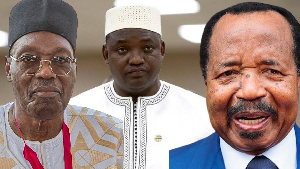The Emergency Committee of the world’s football governing body, FIFA, has postponed the election of a new president for FECAFOOT to February 28, 2015 at the latest.
Cameroon’s Minister of Labour and Social Security, Gregoire Owona, and Sports and Physical Education Minister, Adoum Garoua travelled to FIFA headquarters in Switzerland on November 26 to discuss the matter.
Their main worry was over possible violence that can emerge at the elections if they went ahead as planned after several potential candidates were deemed ineligible to stand.Concerns were also raised about some of the FECAFOOT statutes used in the election process.
In its November 28 statement, FIFA said, “…The FIFA Emergency Committee has today decided to allow the postponement of the elections of the Cameroonian Football Association (FECAFOOT), which were scheduled for November 29, 2014, on condition that they postpone it to 28th February 2015 at the latest.”
‘Furthermore, the Emergency Committee decided to extend the mandate of the Normalisation Committee accordingly and that the elections should take place according to the new statutes adopted on 23 August 2014?.
These decisions were made based on feedback from the Cameroonian authorities, who had expressed concern over security ahead of the upcoming FECAFOOT elections.
FIFA however indicated that the elections would hold with the same candidates, Tombi A Roko Sidiki, Joseph Bell Antoine, Robert Penne, Attah Robert, Jules Nyongha and Mebande Bridgitte.
It also means that the Normalisation Committee would stay on to manage the Nations Cup in Equatorial Guinea.
Tombi A Roko Sidiki, the current secretary general of the normalisation committee, had been set to be elected unopposed as the new president of FECAFOOT. He will now contest February’s polls against the five heads of list who registered on November 10.
Initially, the other candidates were deemed to have failed to submit their correct documents by a November 26 deadline to be considered eligible.
In July 2013, a FIFA-approved normalisation committee headed by former Minister of Sports, Joseph Owona, stepped in to run football in Cameroon after the country was briefly banned from world football for governmental interference.
In March, football’s world governing body extended the mandate of the normalisation committee to 30 November.
The problems in FECAFOOT began in June 2013 when Iya Mohammed was re-elected as president, despite being detained by the Cameroon authorities for alleged financial mismanagement of the state-owned cotton company. Those polls were then cancelled by FECAFOOT’s own appeals committee, after complaints from the losing candidates.
The global suspension then followed when FIFA ruled that FECAFOOT vice-president and former transport minister John Begheni Ndeh had forcibly installed himself as president on 28th June.
Owona was then installed to oversee the normalisation committee and plan for Saturday’s elections.
A well-placed source at FECAFOOT who spoke to The SUN on the basis of anonymity said: “The real thing is that our Beti people want to manage the African Nations Cup in Equatorial Guinea. That is the fact. They think that they can use the normalisation committee to manage the cup so that they will have nowhere to render an account.
If it was a constituted body that managed the world cup, they would have been in problems with the mismanagement of the world cup funds… government had requested a postponement citing security concerns…”
The National Team Coach, Volke Finke is reportedly disturbed by the turn of events, stating that it was due to a similar happening that led to the debacle of Cameroon during the last World Cup.
With all these issues arising, many people find it strange that they cited security concerns as the cause of postponement. To them this claim is unusual and questionable. “If we are hoping to host the AFCON, and we raise issues about security, then how can a country facing such an important problem host a tournament,” our source said.
Attempts to get reactions from some members of the lists running for the elections were largely unsuccessful. We were unable to get reactions from Nouck Protus and Barrister Felix Nkongho.
We however got across to Senator Mbella Moki Charles, Vice President on Tombi’s list, who said: “We shall wait. The postponement by FIFA is to satisfy every stakeholder. It was just the appropriate thing to do, so that people do not think we are rushing through the process because we support a particular candidate.
FIFA’s postponement was the right thing to do as it presents a level playfield for everybody; so that all the candidates who showed interest will have the opportunity to compete fairly.”
Sports Features of Thursday, 4 December 2014
Source: The Sun Newspaper













